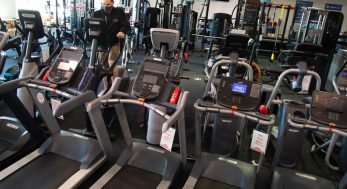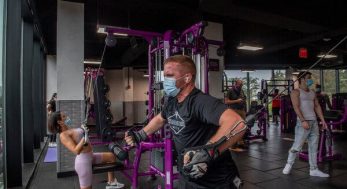If you’re anything like me, a fitness fanatic who thrives on pumping iron, sweating profusely and gasping for oxygen like a fish out of water following a bout of high intensity exercise, then you’re also counting down the days until gyms reopen their doors.
However, the question remains, is it really safe to return to the gym and get your daily fix of exercise induced endorphins, or are gyms germ generating communal hangouts that should be avoided during this global pandemic?
The domino effect of Covid-19 has unequivocally crippled both world health and the global economy. According to worldobesity.org this pandemic “will disproportionately affect the world’s most vulnerable population” and “might contribute to an increase in obesity” as such interventions as “weight loss programmes” and ‘surgery are being severely curtailed.’
With global lockdowns preventing people from leaving home for days, even weeks at a time, “enforced physical inactivity… increases the risk of metabolic disease” as well as self-isolation ‘prompting many to rely on processed food with longer shelf life’ potentially leading to ‘an increase in weight’.
Garth Davis MD, general surgeon and director of Mission Weight Management in Asheville, NC told me: “Opening up in this time of uncertainty is difficult. We know that being healthy and exercising is good for immunity but we can’t escape the fact that gyms are indoors, people end up in close proximity, and forceful expelling of air is common. Air filtration systems, masks, cleaning hands and equipment, and social distancing all help but they do not eliminate risk. Many young healthy gym goers may think that they are healthy enough to survive an infection, but we aren’t worried about them. We are worried about the friends, family and strangers they may come in contact with after their sweat session.”
With one’s health being the best weapon in your arsenal against fighting this disease, surely it is possible for gyms to create an environment that at the very least is safer than pubs to exercise in?
Health clubs and gyms alike have had to consider how to combine safety and comfort for their members. The gym where I work, for example, “will limit member numbers via booking systems; temperature check everyone coming in using face scanners; clean the club and equipment throughout the day using medical grade anti-viral products; we will exceed all guidelines on fresh air ventilation and make touchless hand sanitizers and wipes ubiquitous.”

Third Space Islington.
Despite these military grade procedures being in place for some weeks now to ensure a safe, clean and controlled environment to work/workout in, gym members’ fitness regimes remain on pause until they can once again access their perspiratory playgrounds.
However, patience isn’t our human forte and growing frustration over the past months has in some places led to legal action being. According to Antoni Luke-Akagi, President and managing director of U.S. Operations for Enhancewell LLC, “In NYC, there are a number of class action lawsuits that are gearing up to sue the state to allow fitness centres to reopen.”
As legal pressure mounts, so does public anxiety around the implications of risking a trip to the gym. Akagi told me: “A lot of clientele are still very uncertain about their willingness to come back full force once fitness centres reopen. While being healthy and fit are some of the greatest protectors against a serious bout with this virus. A lot of people are realising that their families health is too valuable.”
As businesses in England put plans in place to reopen on or around July 25, it is likely that many gyms will struggle to retain current clients and recruit new ones until people feel 100% secure in their environment. Akagi told me: “How our industry survives and regains its footing I believe is going to come after a vaccine is developed.”
No matter how you look at it, we are balancing on the blade of a double edged sword, we know a healthy active lifestyle is our best defense against Covid-19, but are people mentally prepared to commence exercising in a confined space amongst others? What does the future look like for avid gym goers?
James Exton, cofounder of London Muscle told me: “The conventional gym based membership model has undoubtedly been detrimented; however, other areas have flourished, particularly the digital fitness sector.” According to Exton, it’s not just the demand for their digital exercise and nutrition e-guides that have spiked: “Our LDNM Academy, qualifying students as Personal Trainers, has seen a huge uplift too. People wanting to re-skill, or just make the most of having more time available than previously.”
Regardless of innovative adaptation making health and fitness services accessible worldwide, old habits continue to die hard, as select minorities disregard their health and wellbeing for past pleasures. The European office of the World Health Organizations (Euro WHO) advice regarding alcohol and Covid-19, suggests to “avoid alcohol altogether so that you do not undermine your own immune system and health and do not risk the health of others.”
Yet, on Saturday July 4, Londoners flocked to the streets of Soho to quench their thirst following lockdowns lifted limits, completely disregarding Euro WHO’s advice to “stay sober so that you can remain vigilant, act quickly and make decisions with a clear head, for yourself and others in your family and community.” Clearly demonstrating that pubs and bars are simply unable to control their environment in such a pandemic, and as for the intoxicated individuals amassing in and around them, that’s another story.
I am sure you will agree that the decision to open pubs and bars before gyms was extremely controversial, we know that being fit and healthy through exercise are among our best individual defenses against Covid-19 and it’s apparent that now is the time for gyms and health clubs to re-open. What is more important however; is that exercise enthusiasts respect these environments, respect others within them and ensure we do everything we can to of-course remain fit, but also reduce the risk of further spread.

